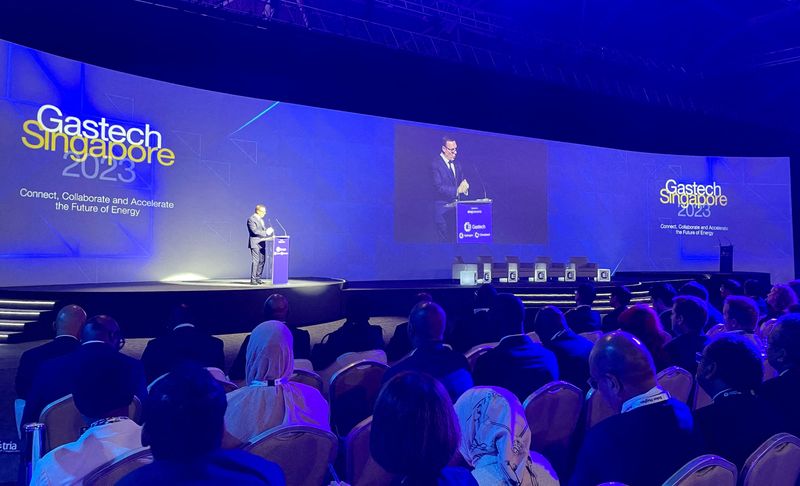By Emily Chow
SINGAPORE (Reuters) -Global liquefied natural gas (LNG) prices have reduced significantly but are still high on a historical basis, resulting in demand destruction, particularly in parts of Asia, a senior executive at Shell (LON:RDSa) said on Wednesday.
Market sentiment has improved over the last year, but conditions are still potentially fragile, Steve Hill, the company's executive vice president, told reporters on the sidelines of the Gastech conference.
"The sentiment in the market today is clearly a lot better than last year, prices are much lower, there's more comfort in the market, but we potentially still have quite a fragile set of market conditions," he said.
"Russian gas is still not flowing to Europe, and therefore the whole market situation is tighter."
Shell is looking to increase its LNG volumes by 20% to 30% by the end of the decade, said Cederic Cremers, executive vice president of Shell's LNG business.
He added that the additional capacity is primarily coming from phase 1 of LNG Canada, two projects with Qatar Energy in Qatar and an additional LNG train in Nigeria.
On Shell's Prelude floating LNG facility off Western Australia, Cremers said it was currently undergoing "major turnaround" work that started in August and will be ongoing for roughly two months.
"(We) continue to have smaller issues that we have to resolve based on the novel nature of the operations and the facility there, but we've seen very strong improvement over the first half of the year," he said.
The turnaround work was originally scheduled for last year but was delayed due to industrial action at the plant, Cremers said.
"It's an important turnaround. It's effectively the first large one you normally do after four or five years after you start up, where we were really able to address some of the things that you have lingering from designs."

In May, Shell suspended production at Prelude, a 3.6 million metric tons a year LNG facility, due to problems with its processes.
Shell also faced disruptions at Prelude after a small fire broke out in December, leading to a production suspension. That came after production and shipments were disrupted from July to September last year due to work bans by unions seeking better pay.